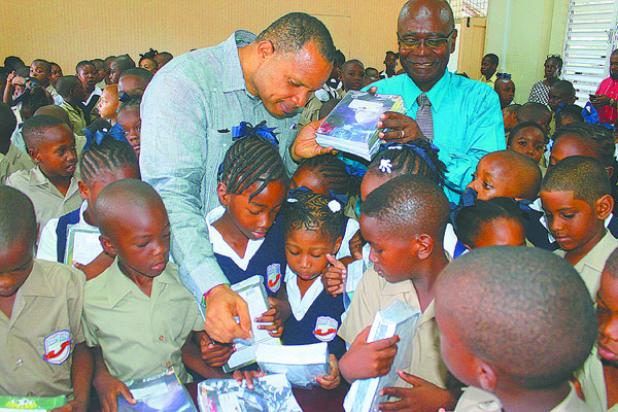Collection of cell phone tax on target, says Finance Minister

Finance Minister, Christopher Sinckler, speaking to pupils of the Eagle Hall Primary School about the exercise books he moments earlier donated to the school, on behalf of The St. Michael North West Foundation. Also pictured is Principal of the School, Orlando Jones (right).
By:
Marsha Gittens
The cellular phone tax which was imposed earlier this year has been serving its purpose, according to Finance Minister, Christopher Sinckler.
He told the media yesterday that the collection of this tax to date “has been going pretty well”.
“So far it has been very, very close to target, if not on top of the target. Of course, we are only through the first nine months of the year and we have to see how it runs the rest of the calendar year, and then moving on to late at the end of the fiscal year next year, but so far it has been doing well…from all reports.”
The target of the tax, Sinckler pointed out, “was about 18 million dollars”. The mobile tax was introduced at the start of this year and caused the rate of Valued Added Tax (VAT) on the mobile phone services to increase from 17.5 per cent to 22 per cent. The revenue generated via the tax is expected to be used to fund tertiary education.
Sinckler was at the time speaking to the media on the sidelines of a presentation of 2000 exercise books to students of the Eagle Hall Primary. This was one of three donations done by The St. Michael North West Foundation on the day. He also made a donation of books to the Nightingale Children’s Village and Deacons Primary School.
Sweet Drinks Tax
Turning his attention to speak about 10 per cent excise tax imposed on the cost of locally produced and imported sweetened beverages from August 1st last year, Sinckler said the collection of this tax “has been running just below trend.”
“We have not seen a dramatic decline in the use of sweetened beverages yet, but it comes with time. We didn’t expect that we would see that within the first year, it is going to take some time. But in terms of the actual tax collection, it has been running smoothly. We have not had any major complaints.”
The tax, which was applied to beverages including carbonated soft drinks and sports drinks, was expected to generate over $10 million in revenue.
Section: